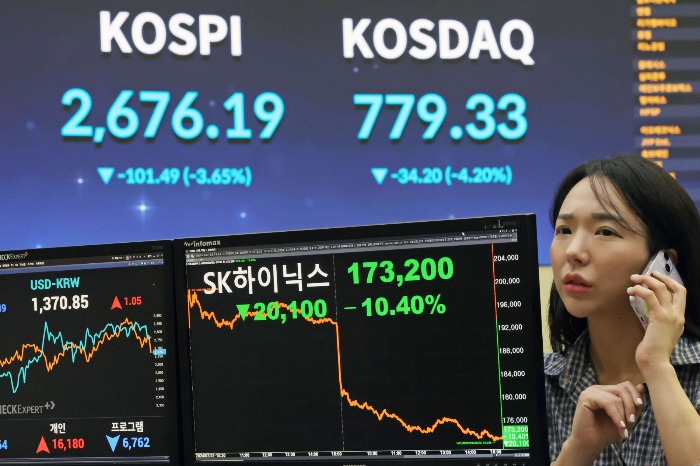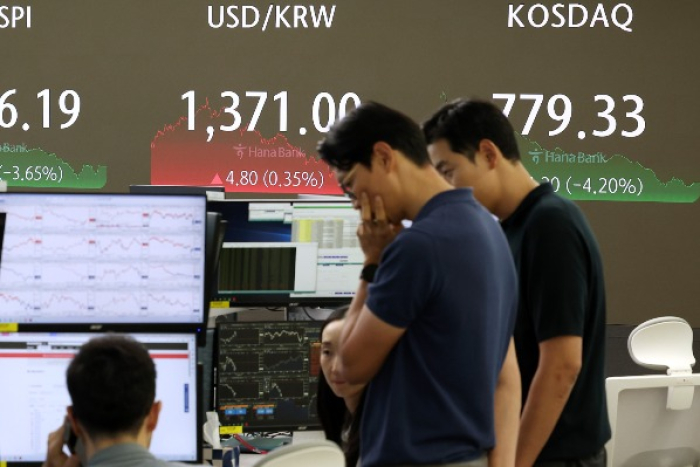S.Korean stocks log largest daily loss since pandemic
Foreign investors dumped Kospi futures; oil and gas suppliers extended their upward runs
By Aug 02, 2024 (Gmt+09:00)
Samsung steps up AR race with advanced microdisplay for smart glasses


When in S. Korea, it’s a ritual: Foreigners make stops at CU, GS25, 7-Eleven


Maybe Happy Ending: A robot love story that rewrote Broadway playbook


NPS yet to schedule external manager selection; PE firms’ fundraising woes deepen


US auto parts tariffs take effect; Korea avoids heavy hit



The South Korean stock market dropped more than 3% on Friday to breach the psychologically important barrier of 2,700 in almost two months, after weak US jobs and manufacturing data stoked fears of a possible recession, prompting massive selling by foreign investors.
The Kospi slid 3.67% to close at 2,676.19 on Friday, its lowest finish since June 4 when it ended at 2,662.10. The index erased 7.4% from its 2024 high of 2,891.35 recorded last month.
Friday’s finish marked its largest daily percentage loss in four years. Its previous biggest single-day loss was 3.66% on August 20, 2020, at the height of the COVID-19 pandemic.
The share price of bellwether Samsung Electronics Co., the world's largest memory chipmaker, lost 4.21% to close at 79,600 won. It wiped 20.9 trillion won ($15 billion) off its market capitalization on Friday alone.
Its local rival SK Hynix Inc. suffered its worst day in 13 years. Its share price plunged 10.4% to close at 173,200 won, its biggest percentage drop for a single day since losing 12.24% on August 18, 2011.
Foreign investors sold a net 1.92 trillion won ($1.4 billion) on the Kospi 200 futures market, betting on further declines in South Korean stocks. The sell-offs marked their largest amount of net selling in the domestic stock futures market for a single day in almost one year.
The junior Kosdaq stock index dropped 4.2% to end at 779.33.
After the release of the latest US jobless claims and manufacturing activity data, investors fretted that a possible rate cut by the Federal Reserve next month, as signaled by Fed Chair Jerome Powell on Wednesday, might be too late to revive the economy.
Initial jobless claims in the US rose the most since August 2023 last week. The ISM manufacturing index, a barometer of factory activity in the US, came in worse than expected at 46.8% in July.
A reading of the manufacturing index below 50% indicates the economy is slowing. The data was released a day after the US central bank kept interest rates unchanged at a 23-year high of 5.3%.

But analysts played down the economic recession risk and said Friday's stock market falls would not indicate a shift in stock market movement.
They noted the softer-than-expected US data could justify steeper-than-expected rate cuts to prop up the economy amid cooling inflation.
"There is very little evidence to suggest that a recession is imminent," said Park Hee-chan, research head at Mirae Asset Securities. "The US economy is expected to make a soft landing."
OIL AND GAS COMPANIES SHINE
Bucking the trend, oil refiners and gas suppliers extended their upward runs this week in anticipation of a rise in oil and gas prices amid escalating geopolitical risks in the Middle East.
Korea Petroleum Industries Co. shot up 13.86% to end at 23,000 won thanks to aggressive buying by individual investors. Kosdaq-listed Heungu Oil Co. gained 3.35% to 18,830 won.
Write to Han-Shin Park at phs@hankyung.com
Yeonhee Kim edited this article.
-
 Korean stock marketKospi on upward run; individual investors turn bearish
Korean stock marketKospi on upward run; individual investors turn bearishJul 08, 2024 (Gmt+09:00)
3 Min read -
 Korean stock marketKorean stocks linked to a Trump victory soar after shooting
Korean stock marketKorean stocks linked to a Trump victory soar after shootingJul 15, 2024 (Gmt+09:00)
3 Min read -
 Korean stock marketForeign net buying of S.Korean stocks hits all-time high
Korean stock marketForeign net buying of S.Korean stocks hits all-time highJul 08, 2024 (Gmt+09:00)
3 Min read -
 Korean stock marketKospi 200 firms' values sharply below MSCI developed market rivals
Korean stock marketKospi 200 firms' values sharply below MSCI developed market rivalsMay 03, 2024 (Gmt+09:00)
1 Min read -
 Korean stock marketKorean investors’ risky bet: Buy inverse ETFs as Kospi heads higher
Korean stock marketKorean investors’ risky bet: Buy inverse ETFs as Kospi heads higherJun 05, 2023 (Gmt+09:00)
3 Min read -
 Korean stock marketForeigners gobble up chip stocks in S.Korea, buoying overall Kospi
Korean stock marketForeigners gobble up chip stocks in S.Korea, buoying overall KospiMay 19, 2023 (Gmt+09:00)
3 Min read -

-
 MarketsKospi hits two-year low; regulators mull short-selling ban
MarketsKospi hits two-year low; regulators mull short-selling banSep 28, 2022 (Gmt+09:00)
2 Min read


